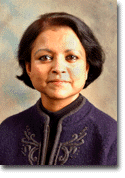| Overview: Stage-specific signal transduction and gene expression, resulting from reciprocal cell-cell interactions and locally produced cytokines and hormones, is critical for T cell development in the thymus. Cues from stromal cells regulate an exquisite balance of proliferation, quiescence, cell-death and cell-fate decisions in developing thymocytes. In turn, thymocytes regulate the maturation of thymic epithelial cells. Mature T cells migrate from the thymus to peripheral lymphoid organs where they differentiate into functional effector cells and mount immune response to pathogens. Finally, as the organism ages, the immune system deteriorates and the ability to combat pathogens declines. Research in the Misra Sen laboratory is focused on understanding signaling events in T cell development, function and aging. |
| First, we are interested in the molecular mechanisms that regulate early stages of T-lymphocyte differentiation and transformation. Specifically, we study the role of the pre-T cell receptor (pre-TCR) in the regulation of early T cell homeostasis, survival, proliferation and differentiation. We have recently discovered that beta-catenin is a target of pre-TCR signaling; it is induced transiently by the pre-TCR and is down-regulated as the cells navigate the beta-selection checkpoint. Lack of beta-catenin expression impairs beta-selection whereas inability to down-regulate beta-catenin expression after beta-selection results in DNA damage, cellular senescence and p53-dependent apoptosis. In the absence of p53 function beta-catenin expression leads to an aggressive thymic lymphoma. Our future studies aim at the molecular understanding of the co-operation between pre-TCR and beta-catenin signals in normal T cell development and transformation. |
- Xu, M., Sharma, A., Wiest D., and Misra Sen, J. 2009. Pre-TCR induced b-catenin facilitates traversal through b-selection by regulating expression of Egr genes. J. Immunol., In press.
|
- Xu, M., Sharma, A., Hossain, M. Z., Wiest D., and Misra Sen, J. 2009. Sustained expression of pre-TCR induced b-catenin in post-b-selection thymocytes blocks T cell development. J. Immunol., In press.
|
- Xu, M., Yu, Q., Difilippantonio, M. J., Ried, T. and Misra Sen, J. 2008. b-catenin expression results in p53-independent DNA damage and oncogene-induced-senescence in pre-lymphomagenic thymocytes in-vivo. Mol. Cell Biol., 28:1713-1723.
|
- Hossain M. Z., Yu, Q., Xu M., and Misra Sen, J. 2008. ICAT expression disrupts b-catenin-TCF interactions and impairs survival of thymocytes and activated mature T cells. Int. Immunol., 20:925-935.
|
- Yu, Q., Misra Sen, J. 2007. b-catenin regulates positive selection of thymocytes but not lineage commitment. J. Immunol. 178: 5028-5034.
|
- Yu, Q., Xu, M., Misra Sen, J. 2007. b-catenin expression enhances IL-7 receptor signaling in thymocytes during positive selection. J. Immunol. 179: 126-131.
|
- Xu, Y., Banerjee, D., Huelsken, J., Birchmeier, W., Misra Sen, J. 2003. Deletion of b-catenin impairs T cell development. Nat Immunol. 4(12): 1177-1182.
|
- Xu, Y., Sen, J. 2003. b-catenin expression in thymocytes accelerates thymic involution. Eur J Immunol. 33(1): 12-18.
|



